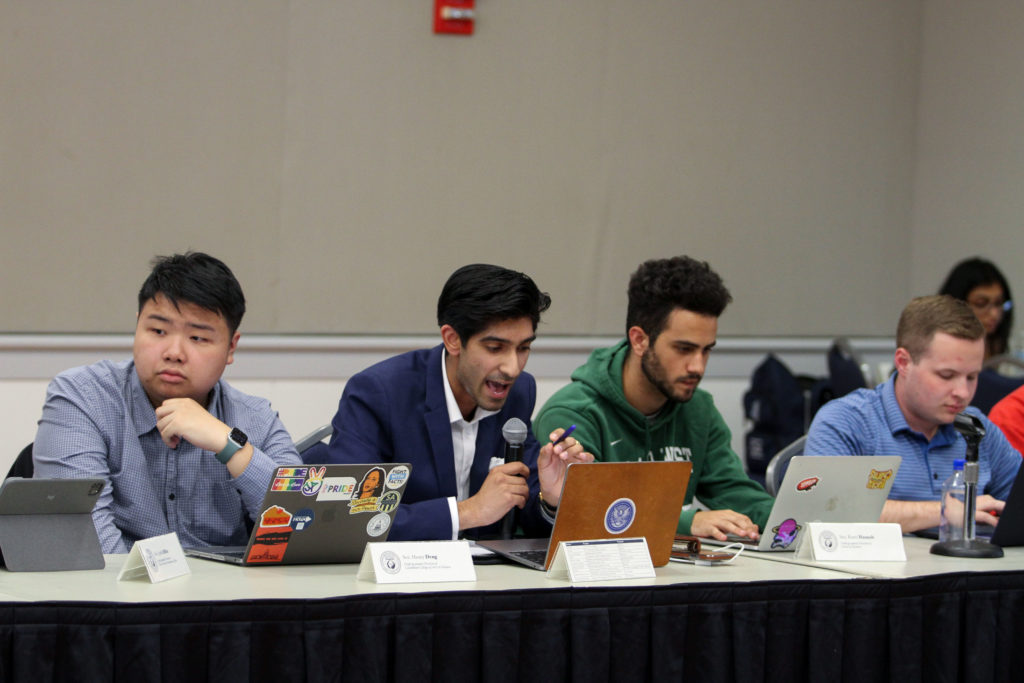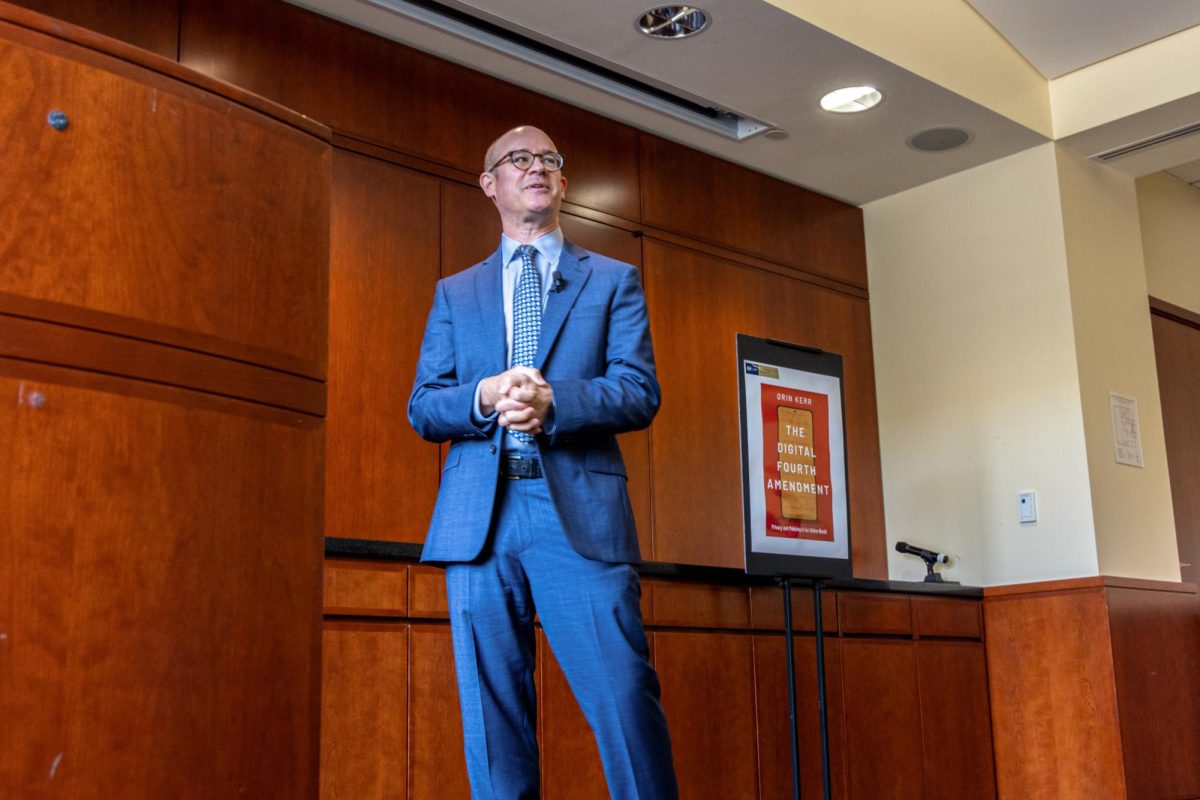The Student Association Senate concluded its final meeting of the 2022-2023 term Monday by unanimously passing 13 pieces of legislation, more than any other meeting this year.
The senate approved legislation regarding allocating funds to student organizations, increasing advocacy for diversity and inclusion through the formation of a new committee and called for improved graduate student housing during the meeting. The meeting, which marked the end of graduating senators’ SA tenures, also tabled departing SA President Christian Zidouemba’s Student Court nominations, rejecting his nominees and allowing incoming President Arielle Geismar to determine the court’s composition.
The Senate approved the General Allocation Part I Act, approving the SA to distribute $459,000 to student organizations for the fall semester. Nathan Nguyen, the director of Legislative Budget Office, said the office received 280 student organization funding applications for next semester, a slight decrease from the 296 applications recorded last cycle. He said student organizations requested a total of $1.7 million in funding in their applications.
The Senate passed the University-Wide Program Fund Improvement Act, which aims to make UWPF more inclusive and broaden its impact on graduate students by contacting graduate student organizations about their events to increase graduate student attendance. The bill’s sponsor SA Sen. Cody Ingraham, Law-G, said the bill highlights some of the program’s “deficiencies” as graduate student organizations do not know how to “navigate” through the fund.
“Graduate students make up a majority of the students attending GW and a majority of the Student Association funds that keep this boat afloat,” Ingraham said. “It is without a doubt that being a member of GW’s campus is a part of their experience. You’re going to have an experience either way, it’s just a choice of whether the university is going to invest in that or not.”
The SA Senate voted in February to change the sports club funding structure by giving deliberation power to the Club Sports Council, which allows the council to collectively decide how much the council allocates to each club sport with the finance committee providing oversight and final approval.
The Senate passed the Graduate Student Inclusion Act, which urges the Office of Student Life to work with University administrators and student organization leaders to “bolster” the graduate student experience by encouraging student organizations to recruit graduate students and implementing mechanisms to communicate involvement opportunities. The bill’s sponsor, Ingraham – who is chair of the graduate student life committee – said he feels “bored” as a graduate student and misses being involved in student organizations that he once enjoyed when he was an undergraduate student.
Ingraham said the bill will encourage student organizations to facilitate “friendships” between graduate and undergraduate students and welcome more graduate students into campus life.
“Hopefully it encourages some mentorship between graduate students and friendships between graduate students and undergrads,” Ingraham said. “Hopefully, it really opens the door for graduate students’ experiences that I think can be so, so robust here at GW.”
Senators also approved the Graduate Student Housing Act, which calls on the University to reinstate an on-campus residence hall for graduate students in an effort to advance graduate student life on campus. Ingraham, the bill’s sponsor, said GW is one of four schools in GW’s 14 school “market basket” that does not offer housing for graduate students.
The University does not currently offer any housing for graduate students. Officials previously offered graduate student housing in The Aston, where Ingraham said he used to live, but officials relocated third- and fourth-year students to the building due to Thurston Hall renovations in 2019.
“It’s a matter not only of community building but one of equity,” Ingraham said. “For low-income and first-generation students who lack the generational knowledge or support to navigate the D.C. housing market, especially those coming straight from undergrad, having some kind of on campus support in navigating that is huge.”
The senate also unanimously approved the DIA New Start Act, which will convert the SA’s Diversity and Inclusion Assembly from a senate assembly into a standing committee and change its name to the Community Advocacy Committee. SA Sen. Henry Deng, CCAS-U – the sponsor of the bill and the current chair of the diversity and inclusion assembly – said he introduced the legislation because he believes in the “next level of representation” and wants to work on encouraging diversity and inclusion among students. He said the bill also gives the renamed committee more opportunities to advocate for the concerns of multicultural and marginalized communities.
“The assembly doesn’t have the same level of settings, equipment and representation as other committees in the senate do, and we believe the DIA is in the awkward and confused position where people don’t know how to act under the current structure,” Deng said.
Aaron Howell, the assistant director of Student Rights and Responsibilities said SRR drafted additional proposed changes to the Code of Academic Integrity due to feedback from the University community following his previous conversation with the SA in March, where he said officials were changing the definition of intentional plagiarism. Howell said the revised changes will exempt pre-college students from adhering to the code because they are not fully matriculated at GW, provide updates related to record maintenance for course failures and make changes for “general clarity and consistency.”
Howell also said officials will remove language that stated students must submit proposed changes to the code to the Board of Trustees for approval to avoid slowing down revisions to the code based on student feedback.
“We are trying to center, gather and incorporate as much feedback as we can and not having to adhere to the timeline of the Board of Trustees will help us do just that,” Howell said.
The senate passed the Climate Emergency Act, which urges the University to declare a “climate emergency” and work to reduce electricity consumption by updating lighting in the university to LED or retrofitted compact fluorescent light bulbs, installing occupancy sensors and ensuring buildings have proper insulation to prevent excess electricity consumption. SA Sen. Kai Simson, CPS-G and the bill’s sponsor, said it will also work to increase the use of solar power to fulfill GW’s goal of carbon neutrality by 2030.
“We believe that GW can continue to be a leader when it comes to tackling the effects of climate change in the DMV area and also nationwide,” Simson said.
Senators also approved the Student Organization Archiving Act, which encourages student organizations to submit copies of memorabilia to the University archive to preserve GW’s cultural history and the Student Association Archiving Act, which will enforce the SA to archive and preserve copies of minutes, legislation and other documents in a publicly-accessible manner.
Senators jointly commended outgoing SA Vice President Yan Xu and recognized the work and accomplishments of the Senate Staff in two appreciation resolutions.
The first meeting of the newly elected SA Senate will be held Monday.











